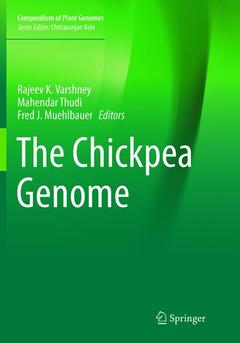Description
The Chickpea Genome, 1st ed. 2017
Compendium of Plant Genomes Series
Coordinators: Varshney Rajeev K., Thudi Mahendar, Muehlbauer Fred
Language: English
Publication date: 06-2019
142 p. · 17.8x25.4 cm · Paperback
Publication date: 02-2018
Support: Print on demand
Description
/li>Contents
/li>Comment
/li>
This book sheds new light on the chickpea genome sequencing and resequencing of chickpea germplasm lines and provides insights into classical genetics, cytogenetics, and trait mapping. It also offers an overview of the latest advances in genome sequencing and analysis.
The growing human population, rapid climate changes and limited amounts of arable land are creating substantial challenges in connection with the availability and affordability of nutritious food for smallholder farmers in developing countries. In this context, climate smart crops are essential to alleviating the hunger of the millions of poor and undernourished people living in developing countries. In addition to cereals, grain legumes are an integral part of the human diet and provide sustainable income for smallholder farmers in the arid and semi-arid regions of the world. Among grain legumes, the chickpea (Cicer arietinum) is the second most important in terms of production and productivity. Besides being a rich source of proteins, it can ?x atmospheric nitrogen through symbiosis with rhizobia and increase the input of combined nitrogen. Several abiotic stresses like drought, heat, salinity, together with biotic stresses like Fusarium wilt, Ascochyta blight, and Botrytis grey mould have led to production losses, as the chickpeas is typically grown in the harsh climates of our planet?s semi-arid regions.
Offers an up-to-date insight into the latest progress in genome sequencing and analysis
Demonstrates how scientific results in plant genomics can be used to improve plant breeding
With contributions of an international board of authors
Includes supplementary material: sn.pub/extras




